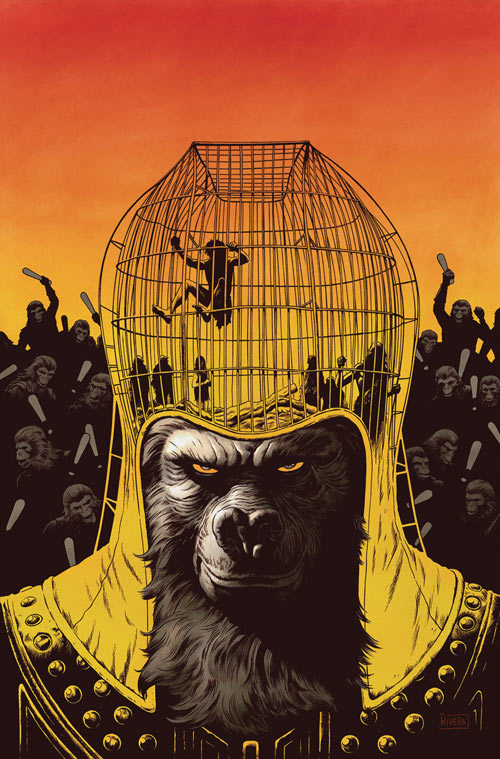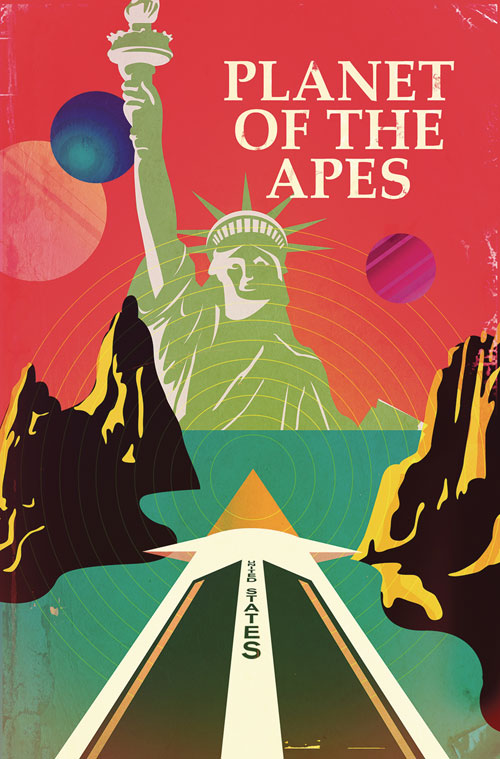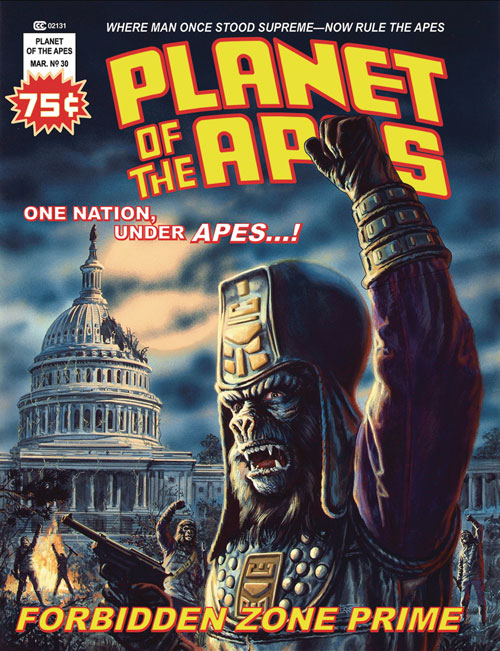General Ursus Shocks The Monkeys
Dec 30, 2017
 |
by Vince Brusio
How is peaceful co-existence possible when those who oppose you uphold their hate as religion? Writer David F. Walker is familiar with the conundrum. He’s versed in the politics of persecution because he was raised on old school Planet of the Apes films. Now he brings that 70s grit with him to BOOM! Studios to deliver a gripping mini-series that kicks off with Planet of the Apes: Ursus #1 (NOV171299). Read our PREVIEWSworld Exclusive interview!
Planet of the Apes: Ursus #1 (NOV171299) is in comic shops January 3.
**********
Vince Brusio: What was your first exposure to Ursus, and how did he impress you? Or is it better to say, how did he disturb you?
David F. Walker: My introduction to General Ursus first came in the black-and-white Planet of the Apes comic magazine. This was back in the early 1970s, and he freaked me out. Then I saw Beneath the Planet of the Apes on television — he scared the hell out of me. James Gregory, the actor who played Ursus, had this distinctive voice, and the way he said, “The only good human is a dead human” — well, that gave me nightmares. I had seen bad guys in movies before, but this gorilla was a genocidal maniac. As a kid, I was obsessed with storytelling, and Ursus was the first villain I ever saw that really sparked my imagination. I’m no more than six or seven years old, and I’m thinking, “Why does this gorilla hate humans so much?”
Vince Brusio: You’re about to give us a story about the all-time greatest bad guy in the Planet of the Apes universe, so what we want to know is will we see blood lust that rivals a tyrant? Will we see darkness that rivals pestilence? What sort of things might we see that we haven’t seen before?
David F. Walker: There will be no shortage of darkness or bloodlust, but it will be balanced out by tragedy and emotional complexity. To be certain, Ursus is the villain, but despite his claims of being a “simple soldier,” he is an incredibly complex gorilla, who has been through a lot. And we’re going to see what he’s been through, as the story explores some very formative moments from his youth, juxtaposed against who he is at the time of the events in Planet of the Apes and Beneath the Planet of the Apes.
In a larger context, this gives me the opportunity to explore aspects of this world that have been touched upon in other comics, but you never really saw in the original movies. We see other ape communities. We see more female characters than just Dr. Zira. We see a larger planet of apes, which is responsible for shaping Ursus into the grim war monger, with a lust for blood in his heart.
Vince Brusio: This doesn’t appear to be an easy story to craft. You really don’t want to champion a villain, but yet you want him to be interesting enough to the point where you might be able to convince the reader that there’s a reasonable explanation for why torment can naturally turn into something more terrible. The raw deal that would make any saint a sinner. Is that fairly close to one of the challenges you had in developing Planet of the Apes: Urus #1?
David F. Walker: Truth be told, there are aspects of this story that I wrote when I was about six or seven years old. This is literally the Planet of the Apes story I wanted to write when I was a kid, only with a bit more sophistication and nuance than I had back then. It might seem unlikely, but two considerable influences in this story were the films Blade Runner and John Ford’s western The Searchers. I’m that person that believes the true hero of Blade Runner was the character Roy Batty. Likewise, John Wayne’s character in The Searchers is the villain, even though he’s presented as the hero. For me, the challenge of this series was writing a character that straddled the line between villain and hero, and depending on your mood while reading it, could be one or the other.
Vince Brusio: Ever hear the mantra “hell hath no fury”? Might you try to match such rhetoric with “generals have no guilt”? This is a character who leads an army. He has to inspire pride, fearlessness, and solidarity. Have you studied rhetoric from past popular war time figures to help you formulate what speech Ursus may craft for his crowd?
David F. Walker: I went into this story with the idea that the speech Ursus gives in Beneath the Planet of the Apes was sort of the crowning moment in his military career — that everything had been a gradual build to that moment. I hadn’t thought about his leadership in terms of rhetoric, though I’m sure that crept into my creative process. Instead, I thought about how hate is formed — how it takes root, begins to grow, and in time, destroys everything in its path. Ursus is a gorilla who has been destroyed by hate, but in order to see the extent of the damage, I needed to show his capacity for compassion and love, and from that comes the tragic aspects of his character.
Vince Brusio: Looking back on this book, what was the heaviest stone you had to push up the hill, and how did you move it to stand at the top?
David F. Walker: I’ve been incredibly lucky at this point in my career in comics in that I’ve had a chance to write nearly every character and franchise that I dreamed of writing as a kid. There’s only four or five left on my bucket list, but to be honest, this book and these characters represent every wild dream I had as a child.
The heaviest stone I had to push up a hill for this book was not getting lost in my childhood nostalgia, and indulging myself just because I had landed my dream gig. At the same time, I rewarded the little kid in me, who wanted this more than anything else, and never gave up on being a storyteller. There were a lot of conversations between my current self and my inner child. I had to write a story that worked for hardcore Apes fans, while also creating a tale for people that don’t know that much about this world, or who have never seen the original Apes movies. This series strikes that balance as best as I can, and honestly represents some of my best work as a writer.
 |
 |
**********
Vince Brusio writes about comics, and writes comics. He is the long-serving Editor of PREVIEWSworld.com, the creator of PUSSYCATS, and encourages everyone to keep the faith...and keep reading comics.




